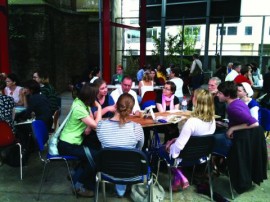Editorial – 2011 April
To play their part in the economic recovery, many workers who have retained employment are being asked to do more, for less.
To play their part in the economic recovery, many workers who have retained employment are being asked to do more, for less.
According to Dany Louise, at the State of the Arts conference artists were given a platform by being squeezed onto a monitor in a corner of the coffee room where they had to shout to make themselves heard. A better […]
I would like to make the following comment to Mark Dean’s Debate, a-n Magazine, March 2011.
My letter, which was published in a-n Magazine (February 2011) regarding the ‘Partners in art’ article from November, ended with the question ‘do you want to know more?
Anna-Marie Gray scrutinises unpaid internships and questions their impact on one’s career prospects.
Comparing blogging to a ‘collective game of hide and seek,’ H.E. Cocker rethinks the blog as a place where an idea can exist without existing at all and where the future is implied whilst not yet written.
Cameron’s Big Society has been criticised for being a cover for spending cuts. Its proposal to shift power from central government to communities and volunteers is not enough to maintain services that will be compromised by deep cuts, many argue.
Dan Thompson’s letter in response to the State of the Arts conference
Dany Louise’s response to State of the Arts conference
Concerning the word ‘spiritual’ in art. Mark Dean considers the historical roots of art’s contemporary alliances to spirituality and asks whether art is the new religion.
While the arts continue to face what Jack Hutchinson describes as “ideological attack from all fronts”, the virtual revolution is giving artists, curators, commissioners and commentators the opportunity to expand their work in new, effective and economical ways.
In the article ‘State of Practice’ in last month’s issue Rich White called for new classifications and a new labelling system for creative works. White discussed the reality of the artist and the necessity of creating new perceptions of artists, […]
Let me start by posing the question: Have you ever seen the film The Rebel starring Tony Hancock?
Re the ‘Beware of the scam’ article on Jobs and opps warning artists of a recent email scam where they are approached by someone who wants to fraudulently buy their work.
Millions of people take an interest in the Turner Prize each year who might otherwise only have a passing interest in Fine Art.
Throughout this year the nation’s attention has been focused first on the prospect of a new government, and then on the shifting messages emanating from the resulting coalition – messages about how we are expected to address the nation’s debt alongside visions of a ‘Big Society’ and coupled with swingeing cuts to public services.
Having worked in the public realm since 2004, I regularly consider who is my primary audience when curating a project.
It’s a peculiar sign of the times that the announcement by the Arts Council of Wales at their annual conference today of a 4% cut to the arts over three years was greeted by the audience of arts professionals with enthusiastic applause and pats on the back all round for securing such a good settlement from the Wales Assembly Government.
“Things are always changing
So don’t be sad and blue
Change can make you happy
‘Cause it brings you something new”.
(Lyric © Sesame Street)
Steve Dutton reflects on the exhausted Biennial model and gives his account of how curators are finding ways to overcome this syndrome.
In these exceptional times, practitioners and arts professionals need to ensure their messages have clarity when making the case for the arts.
Have just picked up on the Liberate the Tate Debate (a-n Magazine, September and October 2010) and will begin by emphatically stating that I am no apologist for the Oil Industry.
Stephen Black suggests that many of the major ‘open submission’ art events are less than democratic in their selection, and therefore a disproportionate number of artists are wasting their money by entering (a-n Magazine, September 2010).
As an artist who has entered open submissions and as a manager of an artist-led, not for profit gallery space (Core Gallery, Deptford) which held its first open submission this year, I feel I can give a slightly different insight into this subject than those laid out in the last two issues of a-n, as to what your open submission fees actually go towards (a-n Magazine, September and October 2010).
The Royal Academy of Arts wishes to record its objection to the published letter by Stephen Black in the September issue of a-n Magazine (Great open submission swindle).


